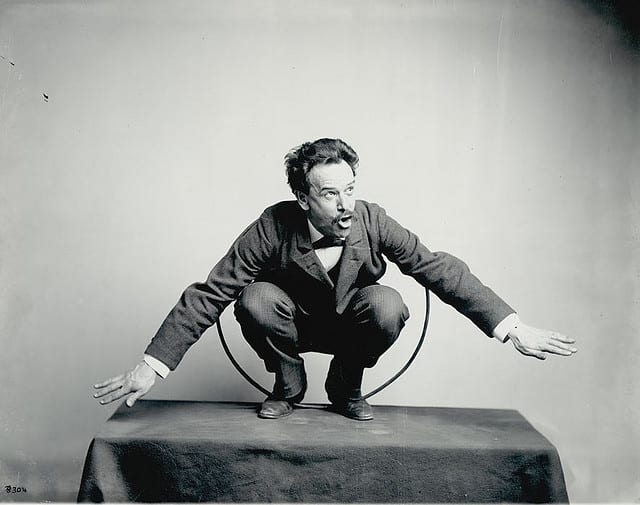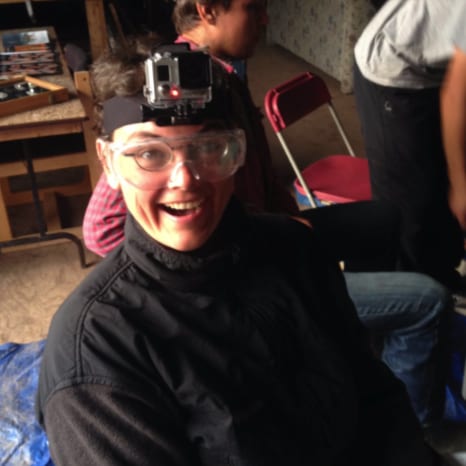“So you're studying anthropology,†my aunt said. “Are you finding any good bones? How do you know where to dig?â€
I sighed. I should be used to it—people relating my work to Raiders of the Lost Ark—but somehow I never am. “I'm not an archaeologist,†I replied. “I'm a cultural anthropologist.â€
“You're a what?†she asked, face pinching and brow furrowing. “What the heck is a cultural anthropologist? Never heard of it.â€
What a great question! It is one I get all the time from family and friends. Cultural anthropology is one of those subjects that people regularly fall in love with in college. However, past intro-level classes, anthropology texts and articles are written for specialists in the discipline.
Indiana Jones? Not Quite…
People may associate anthropology with representations in popular media because the literature is just so inaccessible. That is why my aunt imagines me searching for the Ark of the Covenant instead what I actually do, which is just as amazing. As an anthropologist, I spent a month at wilderness survival school, sleeping in a brush hut and interviewing participants about their conservation values. For another project, I lived in a village with indigenous Costa Ricans to learn about their use of rainforest plants.
As an anthropology student and new writer for the Athens Science Observer, I thought I would compose a few primers on the subject to bring to light just how some anthropologists spend their time.
As a study of human culture, anthropology is constantly evolving. As such, I can never hope to reveal to you all the facets of anthropological studies. Some researchers explore how cultural practices contribute to the spread of disease. Others study the origins of human languages. There is a diversity of traditions and trajectories as the discipline has evolved in different countries. However, I am going to focus on what I know best, which is cultural anthropology.
Just What Is Culture?
It is important to understand how anthropologists define culture. Conrad Kottak, who studied the impacts of television on people's behaviors in Brazil and the U.S., defines culture as, “traditions and customs, transmitted through learning, that form and guide the beliefs and behaviors of the people exposed to them.†Culture is what you need to know and do in order to get along in your everyday life.
What makes schooling compulsory for children in the United States? Culture. What makes Athabaskan speakers from Yukon Territory fear cooking greasy foods near glaciers, which may punish them for the offense? Culture. Why do Ecuadorian Huaorani have elaborate marriage festivals, gorging on palm fruits and holding gender-segregated dances? Culture.
Culture is something that is enacted in everyday behavior; in this way, culture is a verb.
Do not get me wrong; culture does not cause behavior to happen. Supported by other scholars, I believe that culture is something that is enacted in everyday behavior. The ways that we walk, talk, dress, work, and travel are physical manifestations of culture. In this way, to me, culture is a verb: we do culture.
We do not, however, always question how we “do†culture in our everyday lives, and that is where anthropology comes in. For example, my parents critique politics and American youth, but not the ways they use tools, dress, dance, or think about medical treatment. They've never questioned components of U.S. marriage practices, including my mom's white dress or the ritual of bride and groom force-feeding each other cake. Their practices are tacit – understood without anything needing to be said.
Contemporary anthropology was born from the recognition that one's own practices are not the only “right†way to do things; societies have found seemingly infinite ways to adapt to life's problems. For example, Maya descendents in Central America and Mexico have no problem living in extended family households, which are great for sharing labor in subsistence farming. However, my parents in the southern U.S. would find the idea of living with my aunts and uncles ludicrous.
The Early Days of Anthropology
Before we get to contemporary anthropology, let us talk about its history, which is long and heavily contested. As with many disciplines, anthropology extended from the simple observations of long-dead explorers.
One of the first recognized cultural scholars was Herodotus, a Greek scholar from the 5th century B.C. Herodotus traveled through Greece and the First Persian empire, noting the ways that Egyptians were “backwards†from Grecians: “Among them the women shop and sell in the markets; the men stay home and weave..Men carry burdens on their heads, women on their shoulders. The women urinate standing, the men sitting down.†Although Herodotus found some traditions inconceivable, he invoked a sense of wonder about cultural comparison.
Some explorers, however, studied cultures for nefarious purposes. Spanish conquistadors and missionaries in the 16th century studied Aztec practices and battle tactics to manipulate indigenous populations and win battles. Though a few missionaries recorded and appreciated Aztec culture, most worked to eradicate it.
A Shift in Perspective
When anthropology became more firmly established as a science in the 1800s, it was also used to oppress peoples outside of Western Europe. Some scholars operated with the assumption that cultures progressed in stages, with Europeans at the highest stage of advancement and indigenous peoples at the bottom. This theory of “cultural evolutionism†was used to justify the mistreatment of people from less “civilized†societies.

Luckily, one brave anthropologist turned the tide of anthropology in the 19th century: Franz Boas, a German-American anthropologist and savant (besides founding the American anthropology tradition he also had a Ph.D. in physics). While researching with indigenous British Columbians and Pacific Northwesterners he realized that he couldn't imitate or transcribe some of their words. He wrote that his inability was not due to the “savageness†of the languages but his own linguistic upbringing.
Boas connected his extensive research results to advance this theory: people from non-European cultures are in fact taught to perceive, speak, and act in different ways. Each culture is on its own trajectory, with historical circumstances, ecologies, and other factors influencing human development. Each culture stood on its own merits, not in comparison to some European “norm.†Anthropologists today hold to the basic tenet that there is no one exemplary culture to which all others can be compared.
I will end this brief history of anthropology right here. Tune in for further installments, where you can learn just why it is cultural anthropologists spend all their time wearing beige khaki and scribbling in notebooks.
About the Author
 Jennifer DeMoss is a doctoral candidate from the University of Georgia's Anthropology and Integrative Conservation programs. She is currently in the field researching social relationships between people and landscapes within educational programs in the Nature Connection Movement. She uses tools such as GoPro cameras strapped onto her head to video social interactions as part of her research. When she's not interviewing people, she loves to camp, practice primitive skills, carve spoons, and swim in spectacular northern lakes. You can contact Jen at jdemoss@uga.edu. Jennifer DeMoss is a doctoral candidate from the University of Georgia's Anthropology and Integrative Conservation programs. She is currently in the field researching social relationships between people and landscapes within educational programs in the Nature Connection Movement. She uses tools such as GoPro cameras strapped onto her head to video social interactions as part of her research. When she's not interviewing people, she loves to camp, practice primitive skills, carve spoons, and swim in spectacular northern lakes. You can contact Jen at jdemoss@uga.edu. |
About the Author
- athenssciencecafehttps://athensscienceobserver.com/author/athenssciencecafe/April 17, 2020
- athenssciencecafehttps://athensscienceobserver.com/author/athenssciencecafe/April 12, 2020
- athenssciencecafehttps://athensscienceobserver.com/author/athenssciencecafe/April 3, 2020
- athenssciencecafehttps://athensscienceobserver.com/author/athenssciencecafe/March 30, 2020







